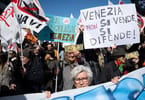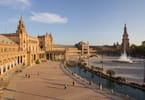Ireland’s Prime Minister Micheal Martin announced that the country’s government is set to cancel almost all of its COVID-19 restrictions on Saturday, January 22.
“We have weathered the Omicron storm,” Martin said in today’s national televised address, in which he said booster vaccines had “utterly transformed” the situation in the country.
“I have stood here and spoken to you on some very dark days. But today is a good day,” he said.
Ireland had the second-highest new infection rate of COVID-19 in Europe just last week but also one of the continent’s highest rates of booster vaccinations, which has helped keep the number of seriously ill people well below the previous peak.
Ireland has been one of the most cautious EU states on the risks of COVID-19, putting in place some of the longest-running restrictions on travel and hospitality.
But after coming through the storm of the omicron variant that led to a major surge in infections and following advice from public health officials, the government decided that bars and restaurants will no longer need to close at 8pm, a restriction put in place late last year when the omicron wave struck, or to ask customers for proof of vaccination.
Nightclubs opened their doors for the first time in 19 months in October only to be shut again six weeks later.
Capacity in indoor and outdoor venues is also set to return to full capacity, paving the way for full crowds for next month’s Six Nations rugby championship.
Some measures, such as the need to wear a mask on public transport and in shops, will remain in place until the end of February, Martin said.
Irish tourist industry, which has been particularly hard hit by one of Europe’s toughest lockdown regimes, welcomed the decision.
While the economy recovered rapidly last year, about a third of employers have chosen to defer tax payments and the wages of one in 12 workers are still being supported by a state subsidy scheme set to end in April.
IHE Ị GA-Ewepụ na edemede a:
- But after coming through the storm of the Omicron variant that led to a major surge in infections and following advice from public health officials, the government decided that bars and restaurants will no longer need to close at 8pm, a restriction put in place late last year when the Omicron wave struck, or to ask customers for proof of vaccination.
- While the economy recovered rapidly last year, about a third of employers have chosen to defer tax payments and the wages of one in 12 workers are still being supported by a state subsidy scheme set to end in April.
- Ireland has been one of the most cautious EU states on the risks of COVID-19, putting in place some of the longest-running restrictions on travel and hospitality.























